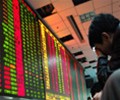

World share markets were back on the climb on Thursday as the U.S. Federal Reserve signalled it was in no rush to taper stimulus and reassurances from Beijing saw beaten-up Chinese stocks leap off the canvas.
There was also some promising news on the long-awaited U.S. infrastructure bill as the Senate voted overnight to move ahead on the $1.2 trillion deal, as well as it being a packed day of earnings and economic data.
The rebound in China’s markets included a near 10% bounce in tech giant Tencent – its second biggest in nearly a decade – after reports that regulators had called banks overnight to ease concerns about the recent crackdown on sectors like tech and education, and on overseas listings.
“Beijing is working hard to stem the growing concerns surrounding its regulatory crackdown,” said RBC’s head of Asia FX strategy, Alvin Tan
Gains pushed blue-chip shares .CSI300 up 1.6%, although they were still down 5% for the week, while the Shanghai Composite Index .SSEC added 1.2%.
It meant European stocks hit fresh all-time highs though as strong earnings from Total and Shell, Airbus and others offset a near 5% drop by Swiss bank Credit Suisse CSGN.S, which reported a near 80% profit plunge in the wake of Archegos and Greensill calamities.
MSCI’s broadest index of emerging market shares .MSCIEF bounced 2%, having slid to its lowest since early December on Wednesday. Japan’s Nikkei .N225 edged up 0.7%, while South Korea .KS11 finished 0.2%.
S&P 500 futures ESc1 were up a more subdued 0.1%. Nasdaq futures NQc1 dipped 0.1%, perhaps weighed by a retreat in Facebook stock.
Facebook FB.O had shed 3.5% in the aftermarket moves on Wednesday after it had warned that its revenue growth would “decelerate significantly”, even as it reported strong ad sales.
Markets had see-sawed overnight when the Federal Reserve policy statement said progress had been made toward its economic goals, seeming to bring nearer the day when it might start tapering its massive asset-buying campaign.
Peak growth was also a nagging theme. Data due later on Thursday is expected to show the U.S. economy likely grew at the fastest pace in 38 years in the last quarter as government aid and vaccinations fuelled spending.
However, Fed Chair Jerome Powell took a dovish turn by emphasising that they were “some ways away” from substantial progress on jobs that is needed to start tapering.
JPMorgan economist Michael Feroli said: “there are three more (U.S.) job reports before the November meeting, and two more between the November and December meetings”.
“We continue to expect a December announcement, though we see a risk it could occur in November.”
While the next Fed meeting is not until late September, the annual Jackson Hole policy symposium is on Aug. 26-28, meaning the tapering talk won’t be taking a break.
For bonds, the net result was that U.S. 10-year yields US10YT=TWEB were steady at 1.24%, not far from recent five-month lows of 1.128%.
“My view is that the Fed policy rate will have a 1% handle” longer term, said PineBridge’s Global Head of Credit and Fixed Income, Steven Oh. “I don’t see an outcome where we see runaway inflation by any stretch of the imagination”.
The pattern was the same for the dollar, which edged up on the FOMC statement only to flag on Powell’s remarks and then dribble lower in both Asia and European trading.
That left the euro up at $1.1871 EUR=, and some way from its recent four-month trough of $1.1750.
The dollar faded to 109.75 yen JPY=, from a top of 110.58 early in the week. All of which saw the dollar index dip to 92.032 =USD, off its recent peak of 93.194.
In commodity markets, China-sensitive copper rose 1.25% and gold nudged up to $1,817 an ounce XAU= but remains in the $30 range of the past 17 sessions.
Oil prices also firmed after data showed U.S. crude inventories fell to pre-pandemic levels, bringing the market’s focus back to tight supplies rather than rising COVID-19 infections.
Brent LCOc1 was last up 73 cents at $75.47 a barrel, while U.S. crude CLc1 added 80 cents to $73.21.
Source: Reuters (Additional Reporting by Wayne Cole in Sydney; editing by Robert Birsel)